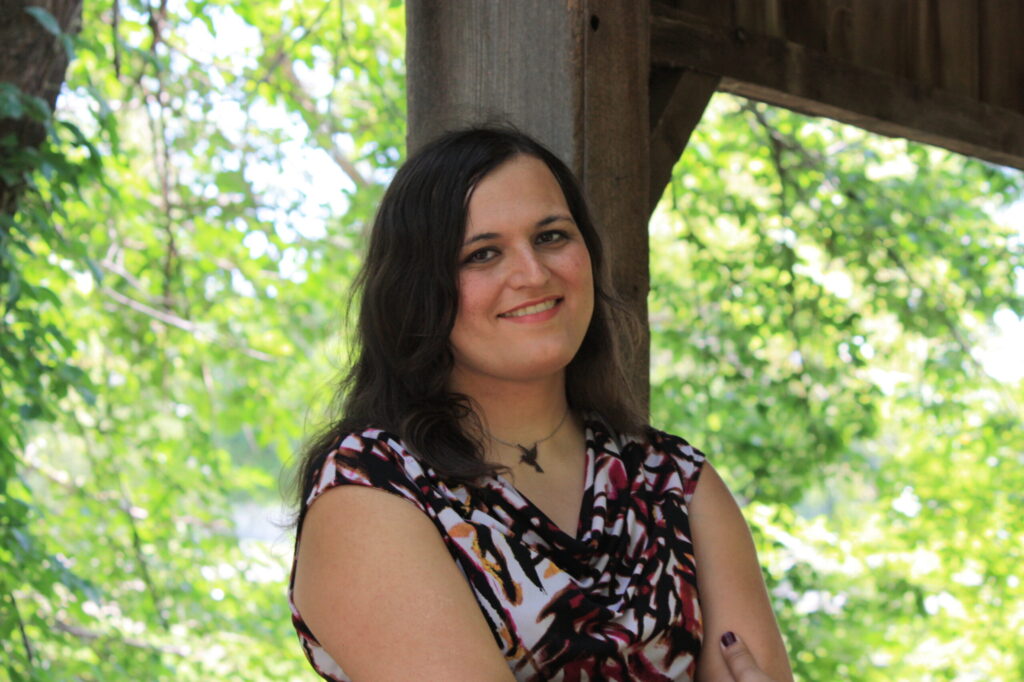LAWRENCE — Kansas House candidate Jaelynn Abegg said her consideration for public office began while advocating earlier this year in Topeka against Senate Bill 160, which would have banned transgender athletes from school sports.
Abegg, who labels herself as a progressive Democrat, is running against incumbent Republican Rep. Brenda Landwehr in the GOP-leaning 105th District of west Wichita. If elected, Abegg said she would focus on expanding health care for Kansans, defending transgender youths and bringing business back to Wichita.
Abegg went to Cowley College and earned an associates degree in Criminal Justice. She served as a police officer in Caldwell for a brief period before becoming a radio host. From there, Abegg found a career path in audio production and hopes to follow her passion for audio production for the rest of her life.
Abegg said she is driven to help people in her occupations — whether it is serving the public as a police officer or as a radio host.
As a progressive, Abegg said it is her job to “collaborate rather than compete and be able to arrive at solutions that work for everybody.”
“As a transgender woman, I am very keenly interested in defending trans youth against what I view as a coordinated attack on them, directly on their existence,” Abegg said.
Abegg was referring to legislation vetoed each of the past two sessions by Gov. Laura Kelly that would have restricted transgender women and girls from participating in school activities. The Kansas Senate overrode the veto this year, but the House didn’t have the two-thirds support necessary to complete the override.
Abegg said she was disappointed by the inattentiveness of the Legislature’s majority to consider and listen to the evidence being presented by opponents of the bill.
“It is a very ideological thing for them,” she said.
Abegg said the Legislature’s idea of blocking access to gender-affirming care for transgender youths also is a “frightening prospect.” Abegg said she knows of clients at a Kansas clinic who travel hours to access transgender health care because they can no longer receive it in their home state.
“Now that we have the vocabulary and the knowledge to be able to help children live their fullest and most authentic life, to see it really pretty maliciously stripped away from them, it’s just maddening,” Abegg said.
Abegg also wants the state to expand access to health insurance to low-income families, an option made available through passage of the Affordable Care Act in 2010.
“There has been an inability by the Legislature for the past few years to expand Medicaid and to take advantage of some of the federal dollars that are available to us,” Abegg said.
She said the lack of quality health care available to Kansans is an issue, especially mental health care, which Abegg said is a personal issue close to her heart.
“I would really like to see as many options as possible be made available to all Kansans to be able to access quality health care, and I just don’t see it happening,” Abegg said.
According to the Kansas Hospital Association, 9% of Kansans were uninsured as of 2018, which was equal to the national average. Compared to the rest of the country, Kansas had a lower uninsured rate than 15 other states. Of those insured in Kansas, 55% received employer-based insurance.
Abegg, who is a lifelong Kansan — with the exception of a couple years in New York — and has lived in several cities across the state, said bringing businesses back to Wichita is important for her district.
Abegg said there has been an “exodus of businesses” in Wichita. She referred to the closure of the Boeing facility in 2013 and the loss of small businesses because of the COVID-19 pandemic.
“(Business loss is) not necessarily unique to Wichita, but as a place where larger corporations can call home, I feel like there’s not too much incentive right now for businesses to move into the area,” Abegg said. “That’s something that I definitely intend to take a look at as well.”
Abegg said she looks at Rep. Stephanie Byers, a Wichita Democrat, as a role model. Byers was Kansas’ first transgender lawmaker and a member of the Chickasaw Nation. Abegg is a citizen of the Cherokee Nation.
“(Byers) and I probably do things a little bit differently, but I know that we agree on a lot of points,” Abegg said. “We’re both very dedicated to the things that we care about.”
Byers decision not to seek reelection this year, after serving her first term.
Abegg said in addition to focusing on transgender equality, she also wants to represent the American Indian population by preserving cultures and celebrating heritage.
Abegg believes there are inherent challenges that come with living in a Republican-leaning district. Abegg compared running against Landwehr to a “David and Goliath situation.”
“I would say, though, that there are almost as many unaffiliated voters in this district as there are Republicans, and I do not consider this a lost cause at all. … I understand that this race is going to be a learning process for me,” Abegg said.
Landwehr served in the Kansas House of Representatives from 1995 through 2012, returned in 2017 and has been in office since. She didn’t respond to requests to comment for this story.
Abegg said she expects Landwehr to “use every tool in her box to try to minimize” who Abegg is and to try to drag her down “in the minds of the constituents.”
“The main challenge I think is just keeping up the optimism and the strength to see this through because I know it can be done,” Abegg said.

